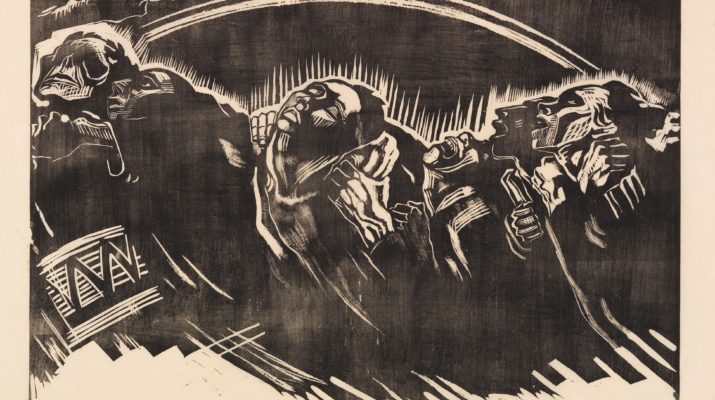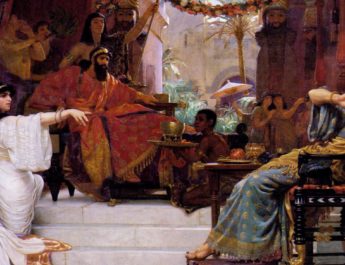Psalm 112
1 PraiseA the Lord!B
HappyC are thoseD who fearE the Lord,F
A “praise” = halal. This is to be clear – it originally referred to a sound, then a color. It was to shine and then make a show or boast then to rave. In a causative sense it came to mean celebrate, give glory, sing praise, or be worth of praise. Because of the celebratory nature of the word, it could also mean to give in marriage. This is where Hallelujah comes from.
B “Lord” = Yah. From YHVH (proper name of the God of Israel; God, Lord; the self-existent or eternal one); from havah (to become) or hayah (to be, become, happen)}. This is Lord or God – a shortened form of God’s most holy name.
C “happy” = esher. From ashar (to go straight, lead, guide; to be level and so to be right, blessed, honest, happy). This is happy or blessedness.
D “those” = ish. Perhaps from enosh (human, humankind, mortal); from anash (to be weak, sick, or frail). This is man, husband, another, or humankind.
E “fear” = yare. This is to fear, be afraid, dreadful. It can also refer to fearful reverence – to fear in a moral sense is to say to revere, respect.
F “Lord” = YHVH. Related to “Lord” in v1. See note B above.
who greatlyG delightH in his commandments.I
G “greatly” = meod. Perhaps from the same as uwd (firebrand, a poker). This is very, greatly, exceedingly. It can also mean vehemence, force, abundance.
H “delight” = chaphets. Properly, this means inclined towards or bending to. Figuratively, it means to desire, delight in, or be pleased with.
I “commandments” = mitsvah. From tsavah (to charge, command, order, enjoin). This is a commandment, law, ordinance obligation, or tradition. It is something commanded whether by God or by a human authority. This term is sometimes used collectively to refer to the Law.
2 Their descendantsJ will beK mightyL in the land;M
J “descendants” = zera. From zara (to sow or scatter seed; conceive or yield). This is seed or sowing. It can, thus, mean a fruit, plant, sowing time, child, offspring, or posterity.
K “be” = hayah. Related to “Lord” and “Lord” in v1. See note B above.
L “mighty” = gibbor. From gabar (to be strong or mighty; to prevail or be insolent). This is strong, mighty, or powerful. This can imply a warrior, hero, or tyrant.
M “land” = erets. Root may mean to be firm. This is earth, ground, field land, or country.
the generationN of the uprightO will be blessed.P
N “generation” = dor. From dur (to move in a circle, which implies living somewhere or remaining there; it can also be the sense of piling or heaping up). This is a revolution of time, which is to say, an age or generation. It can also be a dwelling or one’s posterity.
O “upright” = yashar. From yashar (to be straight, right, even, smooth, or agreeable; figuratively, to make something pleasant or prosperous). This is straight, right, level. Also, it is pleasing, whether pleasing God or pleasing other people. So, it is upright or righteous.
P “be blessed” = barak. This is to kneel, to bless. It is blessing God as part of worship and adoration or blessing humans to help them. It can be used as a euphemism to say curse God.
3 WealthQ and richesR are in their houses,S
Q “wealth” = hon. From hun (to be easy, be ready, act light). This is wealth, possession, enough.
R “riches” = osher. From ashar (to gain wealth, become rich, enrich; to accumulate). This is fortune or wealth.
S “houses” = bayit. Probably from banah (to build, make, set up, obtain children; to build literally or figuratively). This is house, court, family, palace, temple.
and their righteousnessT enduresU forever.V
T “righteousness” = tsedaqah. From the same as tsedeq (rightness, righteousness, vindication. It is everything that is just or ethical. That which is right in a natural, moral, or legal sense. It also includes just weights (i.e. true weights). Figuratively, this is justice, righteousness, equity – even prosperity). This is righteousness, justice, righteous acts, and moral virtue.
U “endures” = amad. This is to stand up in a literal or figurative sense. So it can be establish, continue, endure, take a stand, act, be a servant, stand still, remain, stand against an enemy.
V “forever” = ad. From adah (to advance or continue; to take away or remove; adorning oneself with ornaments). This is old, perpetuity, eternity. It is a duration going back or forward.
4 They riseW in the darknessX as a lightY for the upright;
W “rise” = zarach. 18x in OT. This is to rise, shine, or dawn. It can also be used to describe symptoms of leprosy.
X “darkness” = choshek. From chashak (to be or become dark). This is literal darkness is contrast to light. Figuratively, it can be obscurity, sorrow, misery, blindness, wickedness, destruction, death. It can also be hiding places. Additionally, it can mean judgment, mourning, ignorance, evil, or sin.
Y “light” = or. From or (to be or become light). This is light, sun, sunshine, dawn, or daylight. Figuratively, it can refer to light from instruction, light of a face (that is to say one that is cheerful or finds favor). It can refer to prosperity or salvation; a light that guides, a light eternal from Zion.
they are gracious,Z merciful,AA and righteous.BB
Z “gracious” = channun. 13x in OT. From chanan (beseech, show favor, be gracious; properly, to bend in kindness to someone with less status). This is gracious, compassionate, merciful, having pity on.
AA “merciful” = rachum. 13x in OT. From the same as rechem (womb); from racham (to love, have compassion, have mercy); from racham (compassion, tender love, womb, compassion; the womb as that which cherishes the fetus). This is compassionate or merciful.
BB “righteous” = tsaddiq. Related to “righteousness” in v3. From the same as tsedeq (see note T above). This is just, innocent, righteous, righteous one, or lawful.
5 It is wellCC with those who deal generouslyDD and lend,EE
CC “well” = tob. From tob (to be pleasing, to be good). This is good, beautiful, pleasant, agreeable, bountiful, at ease. This word is used for goodness as a concept, a good thing, a good person. This can refer to prosperity and welfare as well as joy, kindness, sweetness, and graciousness. So, this is ethically good, but also enjoyably good.
DD “deal generously” = chanan. Related to “gracious” in v4. See note Z above.
EE “lend” = lavah. This is to join, abide with, borrow. Properly, it means to twine, which gives it the sense of joining or uniting. It can also mean to remain or borrow/lend as joining an obligation to another. This root may be where the name/tribe Levi comes from.
who conductFF their affairsGG with justice.HH
FF “conduct” = kul. This is to hold in. So, it can be to contain, measure, guide, or feed. It can also mean to be able to or sustain.
GG “affairs” = dabar. From dabar (to speak, declare, discuss). This is speech, a word, a matter, an affair, charge, command, message, promise, purpose, report, request. It is a word, which implies things that are spoken of in a wide sense.
HH “justice” = mishpat. From shaphat (to judge, defend, pronounce judgment, condemn, govern). This is a verdict or formal sentence whether from humans or from God. It includes the act of judging as well as the place that judging takes place, the suit itself, and the penalty. Abstractly, this is justice, which includes the rights of the participants.
6 For the righteous will neverII be moved;JJ
they will be rememberedKK forever.LL
II “never” = olam + lo. Olam is a long scope of time whether in the past (antiquity, ancient time) or in the future (eternal, everlasting).
JJ “be moved” = mot. This is to shake, slip, falter, stagger, move, fall, give way, waver, be carried.
KK “remembered” = zeker. From zakar (to remember, to mark something so that it can be recalled, to be mindful of, to mention). This is remembrance, renown, memento, recollection, or commemoration.
LL “forever” = olam. Same as “never” in v6. See note II above.
7 They are not afraid of evilMM tidings;NN
their heartsOO are firm,PP secureQQ in the Lord.RR
MM “evil” = ra’. From ra’a’ (to be evil, bad, afflict; properly, to spoil – to destroy by breaking into pieces; figuratively, to cause something to be worthless; this is bad in a physical, social, or moral sense; that which displeases, to do harm or mischief, to punish or vex). This is bad, disagreeable, that which causes pain, misery, something having little or no value, something that is ethically bad, wicked, injury, calamity. This refers to anything that is not what it ought to be – a natural disaster, a disfigurement, an injury, a sin.
NN “tidings” = shemuah. From shama (hear, call, consent, or consider; implies listening intelligently, giving attention; obedience and action are often implied). This is something hard – news, a rumor, fame, announcement.
OO “hearts” = leb. May be related to labab (to encourage; properly, to be encased as with fat; used in a good sense, this means to transport someone with love; used in a bad sense, it can mean to dull one’s senses). This is the heart, courage, one’s inner self, the mind, or the will. Heart is only used in a figurative sense in the Old and New Testaments.
PP “are firm” = kun. Properly, this means in a perpendicular position. So, it is set up in a literal sense – establish, fix, fasten, prepare. In a figurative sense, it is certainty, to be firm, faithfulness, render sure or prosperous.
QQ “secure” = batach. This is to hide for refuge, be secure or sure. Figuratively, it refers to trust, being confident, or hoping.
RR “Lord” = YHVH. Same as “Lord” in v1. See note F above.
8 Their hearts are steady,SS they will not be afraid;
in the endTT they will lookUU in triumph on their foes.VV
SS “are steady” = samak. This is to lean, rest, support, brace, uphold, sustain, or establish. It is to lean on in a positive or negative sense.
TT “in the end” = ad. Related to “forever” in v3. From the same as ad (see note V above). This is until, as far as, before.
UU “look” = raah. This is to see in a literal or figurative sense so stare, advise, think, view.
VV “foes” = tsar. From tsarar (to bind, restrict, narrow, be cramped, an adversary). Properly, this is a narrow or constricted place. Figuratively, it can be trouble, a pebble, an enemy, anguish, or distress.
9 They have distributed freely,WW they have givenXX to the poor;YY
their righteousness endures forever;ZZ
WW “distributed freely” = pazar. 10x in OT. This is to scatter or disperse – whether in a positive sense of sharing abundance or negatively as scattering through force.
XX “given” = natan. This is to give, put, set, offer. It is to give literally or figuratively.
YY “poor” = ebyon. From abah (to consent, obey, want, yield, accept). This is needy, poor, beggar. Someone who is wanting.
ZZ “forever” = ad. Same as “forever” in v3. See note V above.
their hornAAA is exaltedBBB in honor.CCC
AAA “horn” = qeren. This is horn or hill. It can be a flask or cornet, ivory, altar corner, mountain peak, or figuratively power.
BBB “is exalted” = rum. This is to rise or raise, to be high literally or figuratively. So it can also mean to exalt or extol.
CCC “honor” = kabod. From kabad (to be heavy, weighty, burdensome). This is weighty. Figuratively, glorious, abundant, riches, honor, splendor – a reference to one’s reputation or character. This word is often used to describe God and God’s presence.
10 The wickedDDD seeEEE it and are angry;FFF
they gnashGGG their teethHHH and melt away;III
the desireJJJ of the wicked comes to nothing.KKK
GGG “gnash” = charaq. 5x in OT. This is to gnash or grind the teeth.
HHH “teeth” = shen. From shanan (to sharpen, point, pierce; figuratively to teach). This is a tooth, ivory, something sharp, or, figuratively, a cliff.
III “melt away” = masas. This is to melt, discourage, faint. It can be to deteriorate from a sickness or weaken because of sleepiness or an emotional response.
JJJ “desire” = taavah. From the same as avah (to desire, crave, wish for, lust after). This is what is desirable, a delight, greedy, satisfaction, a charm.
KKK “comes to nothing” = abad. To wander off, lose self. This implies to perish, destroy, die, vanish, or be broken or corrupt.
Image credit: “The Volunteers” by Käthe Kollwitz, between 1921 and 1922.




